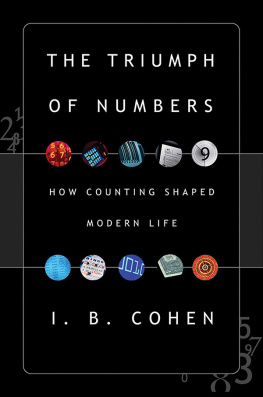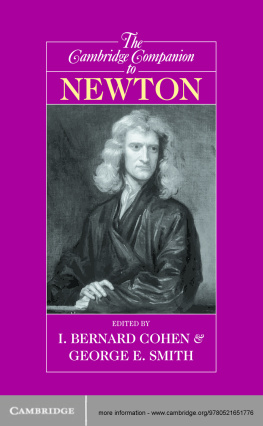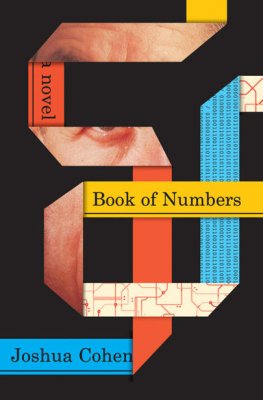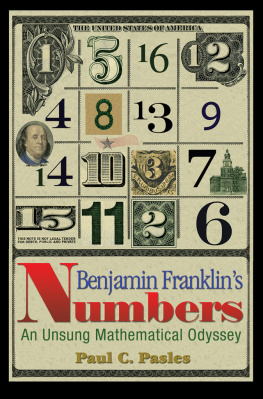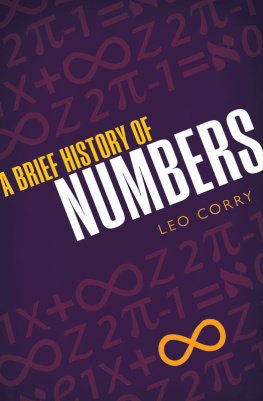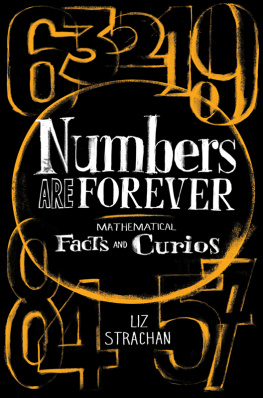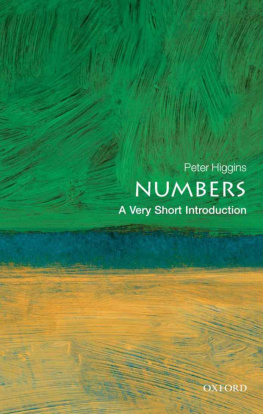
THE
TRIUMPH
OF
NUMBERS

HOW COUNTING
SHAPED MODERN LIFE
I. BERNARD COHEN

Some images in this e-book are not displayed owing to permissions issues.
CONTENTS
Note: Some images in this e-book are not displayed owing to permissions issues.
THE
TRIUMPH
OF
NUMBERS

The Triumph of Numbers, the late I. Bernard Cohens last work, originally came with a long subtitle: How Numbers Entered the Conduct of Life and of Government, the Understanding of Nature, and the Analysis of Society. Various editors, readers, and other commentators, myself included, thought that was too cumbersome, and the less baroque subtitle that the book now carriesHow Counting Shaped Modern Lifewas put in its place.
I suspect Bernard would have objected to these changes in terminology. The verb in his subtitle was entered, not shaped; and the cases he chose to illustrate the making of the numerical worlds of government, nature, and society highlight differences among those domains that the all-encompassing phrase modern life obscures.
That said, the revised subtitle catches the thrust of his work better than his own did in two important respects. First, the history he wished to write is a phenomenon he clearly sawand clearly wanted his readers to seeas a fact of modern life in general. We live in a world of numbers, he says at the very start of , a veritable sea that is of recent origin and, like the air we breathe, now exists everywhere. Second, The Triumph of Numbers is a book with a broad thesis (also announced at the beginning of Chapter 1, but with less fanfare) about the role of something like techniques of counting in the creation of this modern ocean; that thesis holds that numbers would not be all around us today were we not also awash in a stream of inferences, predictions, concepts, theories, calculations, and findings of fact based on them.
The stream in question is, of course, not the only current flowing into our numerical sea. It does, however, stand out from the other major tributaries that Bernard liststhe long-term growth of cities and commerce, the mounting demands of wars on states and societies, and the seemingly relentless expansion of government bureaucraciesin that it appears to have no premodern antecedents. Through all of recorded history, every organized society or system of government has relied on numbers in some way, he tells us, but no systematic analyses of these numbers occurred until well into the seventeenth century, the age of the Scientific Revolution. Even then they were more the exception than the rule and, all other things being equal, might have remained so.
Why they did not is the puzzle around which The Triumph of Numbers is organized, or around which it comes to be organized after a brief excursus on the use of numbers as keys to historical problems. Apart from that detour, the discussion proceeds fairly well apace; having identified a major intellectual watershed and located us on the near side of it, Bernard offers a set of accounts of how we managed to consolidate our position there, that is, how numbers of all sorts came to seem self-evidently worthyand in needof systematic analysis.
The story turns out to be a complicated one, full of odd byways and more than a few dead ends, because numbers have lent themselves to a variety of analytic aims and purposes. As a longtime student of early modern physics and astronomy, Bernard predictably gives initial pride of place to the seventeenth-century discovery that numbers could be used to state general laws of nature and frame questions to test scientific theories. But his essay has mainly to do with the rise (and sometimes fall) of other interpretive programs, such as schemes for arriving at a reasonable estimate of a significant social numbersay, the size of Londons population or the wealth of Francefrom compilations of specific numerical data; for translating commonsense notions about morality into mathematical language; for constructing probabilistic evaluations of voting procedures; for arming medicine with mathematical measures of therapeutic efficacy; for generating evidence of regularities in human behavior from social and vital statistics; for displaying statistical data in ways that made a case for hospital and sanitary reform. On the other side of the coin less obviously rewarding numbers were used to link Martin Luthers name to the number of the beast, to produce magic squares, and to work out the rule according to which lilacs bloom.
Historians of science will recognize many of Bernards stories and most of their protagonists. As his bibliography shows, there is now a substantial scholarly literature on such topics as Keplers astronomy and Galileos mechanics, political arithmetic from John Graunt and William Petty on, Laplaces probability theory and its applications, the numerical method of Pinel and Louis, Quetelets social physics (although not his horticultural ideas), and the statistical enthusiasms of Florence Nightingale and William Farr, not to mention numerology and number mysticism on the one hand and the anti-quantitative polemics of Charles Dickens (Hard Times) and Thomas Carlyle (Chartism) on the other.
The effect, however, of having them brought together in one place is striking. It helps that, while concerned throughout to depict them as parts of a larger whole, Bernard makes much of the contrasting, even contradictory, visions they represent. He does so by way of elaborating on and sharpening his point about the numerical worlds of nature, government, and society being built on very different principles. Simply put, the message is that it was not mathematical physics and astronomy, or political arithmetic, or social statistics that triumphed, but numbers. Nor did any one particular view of how they were to be used win out, and certainly not the grand seventeenth-century hope that, when properly analyzed and interpreted, numbers would reveal universal laws.
The Triumph of Numbers essentially ends with a downbeat comment on the failure of sociological analogs of physical laws to materialize, despite repeated assertions that they were just waiting to be found. That judgment suggests a final observation that Bernard would have appreciated, but which I doubt ever occurred to him. It is that his study resembles Albert Hirschmans well-known essay The Passions and the Interests, or at least might have done with something like a suitably modified version of its subtitle, Political Arguments for Capitalism before Its Triumph.
For this book is ultimately a canvas of arguments, although not always political, for and against numbers before their triumph, indeed before most of the numbers that triumphed really existed, even before the machinery required to produce them was in place. Often in this book Charles Dickens comes across as something of a numerical Luddite. But, perhaps he should have the final word, for one of his more famous novels could have provided Bernard with a fitting subtitlenot Hard Times but Great Expectations.
Peter Buck
Harvard University
August 2004
Albert O. Hirschman,
Next page
